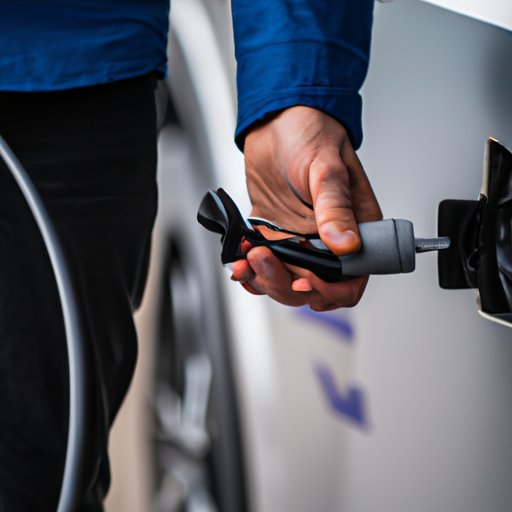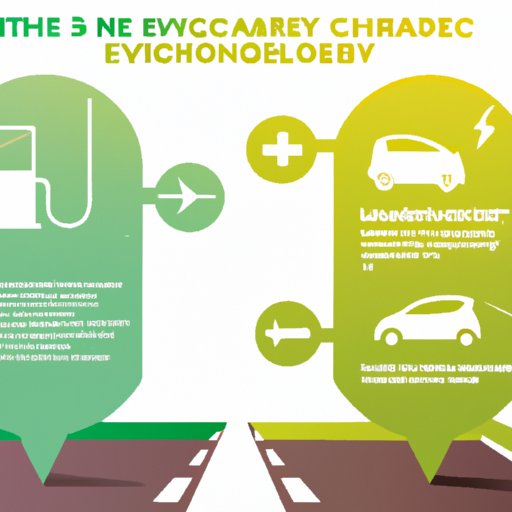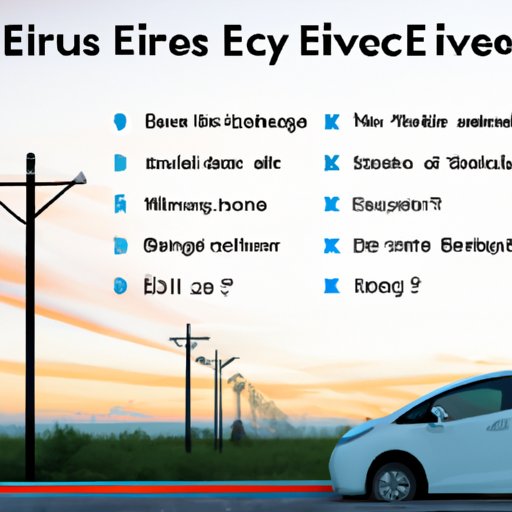Introduction
Electric vehicle (EV) technology is an innovative form of transportation that has gained traction in recent years. It offers a more sustainable and efficient form of transportation compared to traditional gasoline-powered vehicles. This article will explore the basics of EV technology, the environmental benefits of EVs, the growing popularity of EVs, EV battery technologies, and what to expect in the years ahead.

Exploring the Basics of EV Technology
An electric vehicle (EV) is a vehicle powered by an electric motor rather than an internal combustion engine. EVs are propelled by one or more electric motors powered by rechargeable battery packs. The batteries can be charged from an external source of electricity, such as a wall outlet or charging station. There are three main types of EVs: battery electric vehicles, plug-in hybrid electric vehicles, and fuel cell electric vehicles.
The way an EV works is relatively simple. An electric motor is powered by a battery, which is recharged with electricity. The electric motor then drives the wheels, propelling the vehicle forward. EVs typically have fewer moving parts than a traditional gasoline-powered vehicle, so they require less maintenance and have lower operating costs.

Benefits of Electric Vehicle Technology for the Environment
One of the major benefits of electric vehicles is their potential to reduce emissions and improve air quality. According to a study conducted by the International Council on Clean Transportation, “Electric vehicles produce no tailpipe emissions, so they do not directly contribute to local air pollution.” In addition, EVs can significantly reduce greenhouse gas emissions, which are a major contributor to climate change.
Electric vehicles also offer the potential to reduce pollution and save energy. EVs use much less energy than traditional gasoline-powered vehicles, and they do not require any fossil fuels to power them. This means that they emit fewer pollutants into the atmosphere and consume less energy overall.
The Growing Popularity of Electric Vehicles
Electric vehicles are becoming increasingly popular due to their efficiency, convenience, and cost savings. More and more people are realizing the benefits of owning an EV, and the market for EVs is expected to continue to grow in the years ahead. Here are some of the reasons why EVs are becoming more popular:
- Lower operating costs – EVs are cheaper to operate and maintain than gasoline-powered vehicles.
- Convenience – EVs require less time and effort to charge than gasoline-powered vehicles.
- Cleaner air – EVs produce no tailpipe emissions, so they don’t contribute to local air pollution.
- Lower emissions – EVs produce significantly fewer emissions than gasoline-powered vehicles.
In addition, many governments around the world are offering incentives to encourage people to switch to electric vehicles. These incentives, such as tax credits and subsidies, make it even more appealing for consumers to purchase an EV.
An Overview of EV Battery Technologies
EVs use a variety of different battery technologies to power their electric motors. The most common type of battery used in EVs is the lithium-ion battery, which is known for its high energy density and long life. Other types of batteries used in EVs include lead-acid, nickel-metal hydride, and sodium-ion.
Different types of batteries have different advantages and disadvantages. For example, lithium-ion batteries are more expensive than other types of batteries, but they have higher energy densities and longer lifespans. Lead-acid batteries are less expensive, but they are heavier and have shorter lifespans. Nickel-metal hydride batteries are lighter and have longer lifespans, but they are also more expensive.

Understanding the Benefits of EVs for Consumers
For consumers, there are several benefits to owning an EV. One of the biggest benefits is the cost savings. EVs are generally cheaper to operate and maintain than gasoline-powered vehicles. They also require less time and effort to charge than gasoline-powered vehicles, so they offer greater convenience.
In addition, the environmental benefits of EVs cannot be ignored. EVs produce no tailpipe emissions, so they do not contribute to local air pollution. They also reduce greenhouse gas emissions, helping to mitigate the effects of climate change.
The Future of EV Technology: What to Expect in the Years Ahead
The future of EV technology looks bright. As more people become aware of the environmental and economic benefits of EVs, their popularity is likely to continue to grow. Additionally, new innovations in battery technology are making EVs more efficient and affordable, further increasing their appeal.
Furthermore, governments around the world are continuing to offer incentives to encourage people to switch to electric vehicles. These incentives, combined with the growing popularity of EVs, are likely to make them the preferred choice of transportation in the years ahead.
Conclusion
Electric vehicle technology is an innovative form of transportation that offers numerous benefits for both the environment and consumers. EVs produce no tailpipe emissions, reduce greenhouse gas emissions, and are cheaper to operate and maintain than gasoline-powered vehicles. As the technology continues to evolve and become more accessible, EVs are likely to become the preferred choice of transportation in the years ahead.
(Note: Is this article not meeting your expectations? Do you have knowledge or insights to share? Unlock new opportunities and expand your reach by joining our authors team. Click Registration to join us and share your expertise with our readers.)
